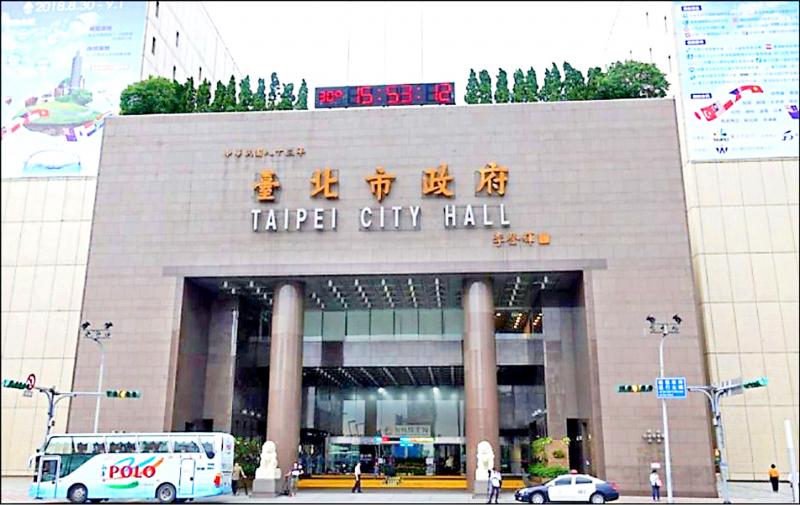The Taipei City Government gave recordings of residents’ helpline calls to a private firm, violating the rights of the callers, two city councilors said yesterday.
Taipei city councilors Miao Po-ya (苗博雅), of the Democratic Progressive Party, and Wu Pei-yi (吳沛憶), of the Social Democratic Party, said the recordings were the callers’ voiceprints, and providing them to an artificial intelligence software developer without their permission violated their rights.
The contract that the city had with the company as part of Taipei’s “smart city” development did not outline penalties for mishandling the recordings, the councilors said, as they called on the city government to temporarily halt the project.

Photo: Taipei Times file photo
Taipei City Research, Development and Evaluation Commission Director Chen Tsung-heng (陳宗亨) said the city informs callers that it records the call, but does not inform them that the recordings are handed over to a contractor.
How the information is managed was determined after work on the project began and had yet to be reviewed by the Taipei Department of Legal Affairs, he said.
Taipei City Department of Information Technology Director Lu Hsin-ko (呂新科) said the project aimed to improve the service on the helpline, and that the city would re-evaluate its handling of the recordings and consult with experts.
The National Development Council yesterday said that under Article 28 of the Personal Data Protection Act (個人資料保護法), public agencies that illegally collect, process or use people’s personal information are liable to pay compensation.
Further investigation is needed to determine whether the city government contravened the law, the council added.
Lawyer Lin Yao-chen (林曜辰) said that while the recordings were legally obtained, the city contravened the law by giving people’s personal data to a contractor and would typically be required to compensate people whose calls were mishandled.
However, as the callers’ identities are unknown, it is unlikely that they would be compensated, he added.
Lin urged the city government to amend its procedures to avoid a recurrence of the situation, and to set clear terms in the company’s contract regarding handling the recordings, including penalties for their misuse.
Even if the callers could not be identified, the project should be halted, Miao said, adding that recordings of about 1,400 people had been sent to the contractor.
Additional reporting by Yang Kuo-wen

CHAOS: Iranians took to the streets playing celebratory music after reports of Khamenei’s death on Saturday, while mourners also gathered in Tehran yesterday Iranian Supreme Leader Ayatollah Ali Khamenei was killed in a major attack on Iran launched by Israel and the US, throwing the future of the Islamic republic into doubt and raising the risk of regional instability. Iranian state television and the state-run IRNA news agency announced the 86-year-old’s death early yesterday. US President Donald Trump said it gave Iranians their “greatest chance” to “take back” their country. The announcements came after a joint US and Israeli aerial bombardment that targeted Iranian military and governmental sites. Trump said the “heavy and pinpoint bombing” would continue through the week or as long

TRUST: The KMT said it respected the US’ timing and considerations, and hoped it would continue to honor its commitments to helping Taiwan bolster its defenses and deterrence US President Donald Trump is delaying a multibillion-dollar arms sale to Taiwan to ensure his visit to Beijing is successful, a New York Times report said. The weapons sales package has stalled in the US Department of State, the report said, citing US officials it did not identify. The White House has told agencies not to push forward ahead of Trump’s meeting with Chinese President Xi Jinping (習近平), it said. The two last month held a phone call to discuss trade and geopolitical flashpoints ahead of the summit. Xi raised the Taiwan issue and urged the US to handle arms sales to

BIG SPENDERS: Foreign investors bought the most Taiwan equities since 2005, signaling confidence that an AI boom would continue to benefit chipmakers Taiwan Semiconductor Manufacturing Co’s (TSMC, 台積電) market capitalization swelled to US$2 trillion for the first time following a 4.25 percent rally in its American depositary receipts (ADR) overnight, putting the world’s biggest contract chipmaker sixth on the list of the world’s biggest companies by market capitalization, just behind Amazon.com Inc. The site CompaniesMarketcap.com ranked TSMC ahead of Saudi Aramco and Meta Platforms Inc. The Taiwanese company’s ADRs on Tuesday surged to US$385.75 on the New York Stock Exchange, as strong demand for artificial intelligence (AI) applications led to chip supply constraints and boost revenue growth to record-breaking levels. Each TSMC ADR represents

Pro-democracy media tycoon Jimmy Lai’s (黎智英) fraud conviction and prison sentence were yesterday overturned by a Hong Kong court, in a surprise legal decision that comes soon after Lai was jailed for 20 years on a separate national security charge. Judges Jeremy Poon (潘兆初), Anthea Pang (彭寶琴) and Derek Pang (彭偉昌) said in the judgement that they allowed the appeal from Lai, and another defendant in the case, to proceed, as a lower court judge had “erred.” “The Court of Appeal gave them leave to appeal against their conviction, allowed their appeals, quashed the convictions and set aside the sentences,” the judges